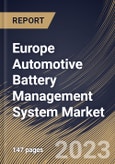Integrating AI and ML in BMS is gaining momentum. These technologies enable more precise battery state prediction, adaptive battery management, and real-time diagnostics. This trend enhances battery efficiency, prolongs lifespan, and ensures safety. Managing the temperature of batteries is vital for their performance and safety. Advanced thermal management systems are being incorporated into BMS to ensure that batteries operate within their optimal temperature range. This enhances both efficiency and safety, particularly in extreme weather conditions. The development and commercialization of solid-state batteries promise to revolutionize the EV industry. These batteries offer higher energy density, faster charging, and improved safety. BMS designed for solid-state batteries will be crucial in optimizing their performance and safety.
As electric vehicle adoption grows, so does the need for responsible battery recycling. BMS will be instrumental in tracking and managing the state of health of battery packs even after their use in vehicles, ensuring that valuable materials can be efficiently recycled. As the electric vehicle sector expands, there is a growing need for standardization in BMS technology. Standardized BMS solutions can lead to greater interoperability between components, reducing development costs and facilitating maintenance and upgrades. Some companies are exploring energy-as-a-service models, where customers pay for their energy rather than the batteries themselves. In such cases, BMS providers play a pivotal role in assuring the performance and longevity of the battery systems.
Europe has some of the strictest emissions standards in the world. To meet these regulations, automakers are increasingly focusing on electric vehicles (EVs) and hybrids, necessitating advanced BMS technology for efficient and compliant battery management. Many European automakers are committing to the electrification of their vehicle lineups. As EV production increases, the demand for advanced BMS systems grows. Due to such aspects the market will boost market growth.
The Germany market dominated the Europe Automotive Battery Management System Market by Country in 2022, and would continue to be a dominant market till 2030; thereby, achieving a market value of $959.3 million by 2030. The UK market is exhibiting a CAGR of 18.2% during (2023 - 2030). Additionally, The France market would experience a CAGR of 20.3% during (2023 - 2030).
Based on Component, the market is segmented into Hardware, and Software. Based on Battery Type, the market is segmented into Lithium-ion, Lead-acid, and Others. Based on Application, the market is segmented into Passenger Vehicles, Commercial Vehicles, and Others. Based on Topology, the market is segmented into Modular, Centralized, and Distributed. Based on countries, the market is segmented into Germany, UK, France, Russia, Spain, Italy, and Rest of Europe.
The market research report covers the analysis of key stakeholders of the market. Key companies profiled in the report include Eberspächer Gruppe GmbH & Co. KG, Sensata Technologies Holding PLC, AVL List Gmbh, LG Energy Solution Ltd., Ficosa International S.A, Leclanché S.A, Nuvation Energy, Futavis Gmbh (Deutz AG), Toshiba Corporation, Elithion, Inc.
Scope of the Study
Market Segments Covered in the Report:
By Component- Hardware
- Software
- Lithium-ion
- Lead-acid
- Others
- Passenger Vehicles
- Commercial Vehicles
- Others
- Modular
- Centralized
- Distributed
- Germany
- UK
- France
- Russia
- Spain
- Italy
- Rest of Europe
Key Market Players
List of Companies Profiled in the Report:
- Eberspächer Gruppe GmbH & Co. KG
- Sensata Technologies Holding PLC
- AVL List Gmbh
- LG Energy Solution Ltd.
- Ficosa International S.A
- Leclanché S.A
- Nuvation Energy
- Futavis Gmbh
- Toshiba Corporation
- Elithion, Inc.
Unique Offerings
- Exhaustive coverage
- The highest number of Market tables and figures
- Subscription-based model available
- Guaranteed best price
- Assured post sales research support with 10% customization free
Table of Contents
Companies Mentioned
- Eberspächer Gruppe GmbH & Co. KG
- Sensata Technologies Holding PLC
- AVL List Gmbh
- LG Energy Solution Ltd.
- Ficosa International S.A
- Leclanché S.A
- Nuvation Energy (Nuvation Research Corporation)
- Futavis Gmbh (Deutz AG)
- Toshiba Corporation
- Elithion, Inc.








